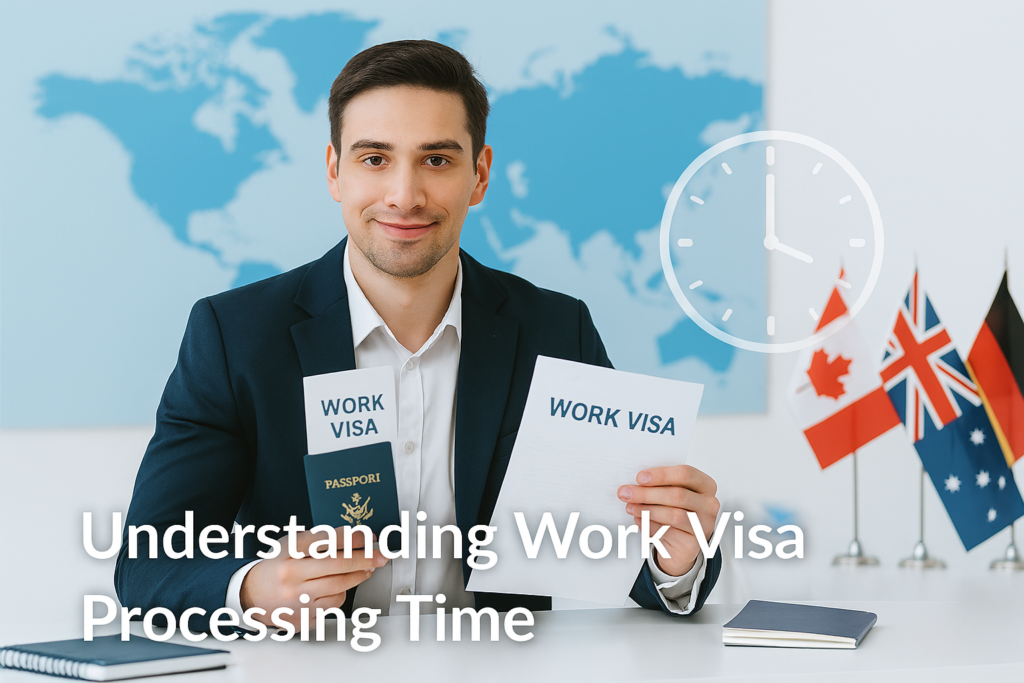What is a work visa and why does processing time matter?
A work visa is a permit that lets you legally work in a country that is not your home country. If you are seeking help from a work visa consultant in Amritsar, knowing how long the process might take gives you clarity on expectations and avoids surprises.
Processing time matters because delays can affect job start dates, relocation schedules, accommodation, and financial planning. Different countries and visa types have different timelines.
Typical timelines for work visas
There’s no one-size-fits-all timeline for a work visa. Here are some general figures:
- For applications to the Immigration, Refugees and Citizenship Canada (IRCC) for work permits, processing times vary depending on application type and country.
- For applications for Indian work-visas (foreign nationals coming into India), one source gives “normal processing time: 3 to 10 days; longer 15+ days if delayed” for an employment visa.
- For general work-permit/visa processing in India via employer sponsorship, another guide suggests approximately 2 to 6 weeks.
- For the UK Visas & Immigration (UKVI) “Skilled Worker” visa category (outside the UK), the listed processing time is about 3 weeks.
From this, you can see that many processed cases can take a few days up to 6 weeks; some might stretch longer.
Key factors that affect the processing time
Several factors influence how fast or slow a work visa application might be processed. Understanding these helps you avoid unnecessary delays.
1. Completeness of documentation
Missing or incorrect documents are one of the most common causes of delays. If your application lacks required papers or information, officials often return or hold it. For example, IRCC states that incomplete applications may be returned without processing.
2. Type of visa & country of destination
Different visa categories carry different checks. Some countries require medical exams, security background checks, or employer certification. For instance, Canada mentions a medical exam can add over 3 months to the processing time.
3. Volume of applications & governmental backlog
If many people apply at once or if staff are limited, processing slows down. The IRCC page mentions that times vary depending on how many applications they have and how quickly information can be checked.
4. Applicant qualifications and employer compliance
Visa authorities check that the employer is eligible, the job offer is valid, and the employee meets criteria. If any of these are weak, extra verification may be needed. For example, in India the employment visa rules require documentary proof of employment or contract.
5. Country-specific bilateral rules and local office workflows
Some countries have special agreements, different standards, or local visa centre processes which add days. For example, guide to Portugal work visa for Indians says 2–4 months depending on consulate workload. TATA AIG
What to expect when applying via a work visa consultant
If you engage a work visa consultant in Amritsar, here is how your timeline can be managed:
- The consultant helps you gather the documents correctly from the start, reducing chances of incompleteness.
- They advise on the correct visa category and prepare you for additional checks (medical, background).
- They monitor your application submission and help you respond if authorities request extra info.
- They keep you informed about typical timelines (based on country and category).
- They may help choose the faster mode (online submission, premium processing, appropriate consulate) when available.
Because of all this pre-work, you may avoid unnecessary delays. However, you must still allow for the variable factors listed above.
Example timeline scenario
Here’s a sample timeline you might use as guideline (though actual times vary):
- Week 1: Consultant and applicant prepare documents (job offer, passport, qualification, employer letter).
- Week 2: Submission of visa application at appropriate centre/online.
- Weeks 3-4: Basic checks, biometrics (if required), employer eligibility verification.
- Week 4: If everything is clear, visa may be issued. If additional checks needed (medical, background), add additional weeks.
- Weeks 5-6+: In cases with delays (document missing, extra verification, high demand), timeline may extend to 6 weeks or more.
Tips to avoid delays
- Submit your application well in advance of your desired start date.
- Ensure all documents are correct, legible and signed where required.
- Use a reliable consultant (such as a trusted work visa consultant in Amritsar) who knows the local process and consular rules.
- Be ready to respond quickly to any additional requests by the visa authority (medical report, proof of employment, address verification).
- Keep copies of everything and track your application status if possible.
When delays are normal
Even with perfect paperwork, delays can happen and still be “normal” rather than a problem. For instance:
- If the visa category requires a medical exam or security check, extra days are common.
- If the consulate is handling a high volume of applications.
- If you applied near peak travel seasons or festival times when staff might be limited.
- If you are applying for a longer-term work visa, or for a country where processing is stricter.
Final thought
The time taken to process a work visa varies widely depending on the country, category, employer, applicant profile and document quality. As a rule of thumb: if everything is in order and no special checks are required, processing may be done in a few weeks. But you should always allow extra buffer time in your planning. Using a trusted work visa consultant in Amritsar helps you navigate the process smoothly and may reduce avoidable delays.








Leave a Reply